Naval Sea Cadet Corps (NSCC) of the United States Navy
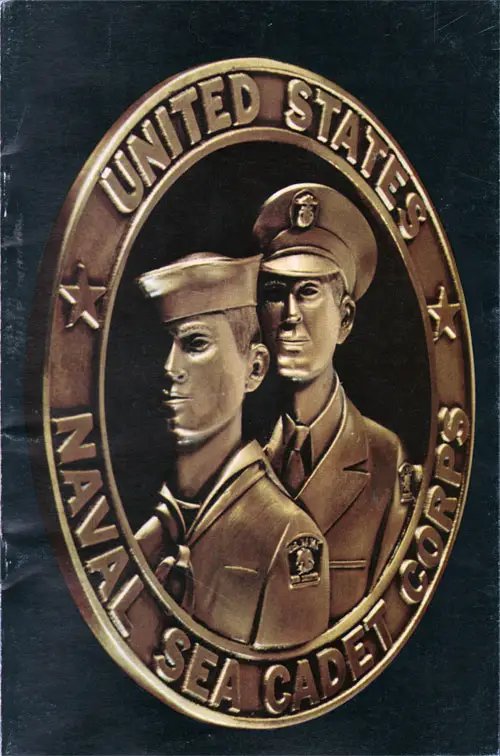
The Naval Sea Cadet Corps (NSCC) was federally chartered as a non-profit organization in 1962. It is a volunteer youth training program for young men 14 through 17 years of age.
The Corps is sponsored by the Navy League of the United States, administered by the NSCC and supported by the Department of the Navy.
Sea Cadets are afforded the opportunity to train in the Seaman, Airman, Fireman and Constructionman rates, (E-1 through E-3).
They have the opportunity to study in the various disciplines including ocean science engineering, Naval Officer preparatory courses, and medicine.
Those who can qualify also study engineering aspects of avionics, nucleonics and conventional shipboard power propulsion.
Below, Admiral Elmo Zumwalt, Chief of Navy Operations, greets new Naval Sea Cadets
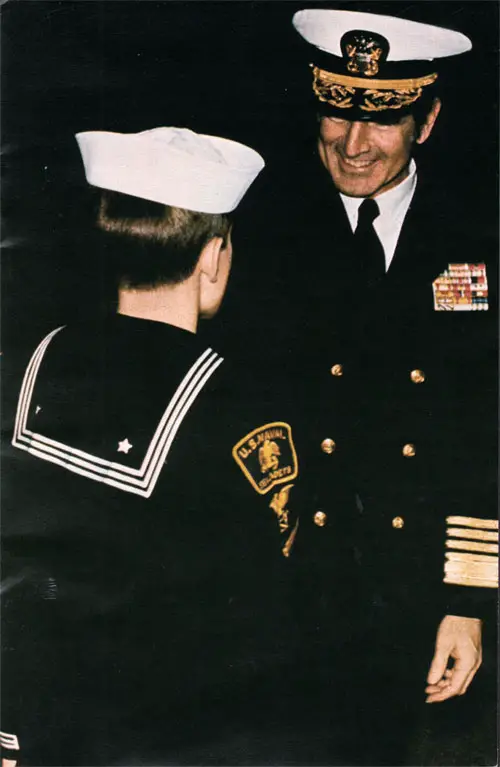
Both the Navy and the Navy League strive to provide the Sea Cadets with an educational base as broad as possible so as to develop the "whole-man" training concept. To that end, civilian as well as military lecturers are encouraged to present to Cadets a wide range of civilian and military career opportunities available to the youth of today and to explain youth's responsible role in society.
Membership in the NSCC is controlled by requiring prospective cadets to pass a Navy academic and physical examination. Quality growth will depend upon the individual cadet's successful completion of this training program, and the motivation, dedication and enthusiasm generated in the Navy and civilian community.
Objectives of the NSCC are clear and simple:
- to develop in young men an interest and skill in seamanship and seagoing disciplines;
- to inculcate in Cadets an appreciation for our Navy's history, customs, traditions and the significance of a modern Navy on the Department of Defense team;
- to build in every cadet a sense of patriotism, courage, self-reliance, and confidence; those qualities which will mold good moral character, citizenship, to the enhancement of the quality of our Nation's manpower; and
- to raise the prestige of a military career and increase the advancement potential of Cadets who may later elect to serve with the Navy.
The Corps is presently organized along lines paralleling the structure of the Navy League. The latter has about 300 local councils across the nation and abroad. Sea Cadet surface divisions, air squadrons or construction battalions are formed, administrated and financially supported by the local Navy League councils and receive the support of a local Naval activity.
The NSCC has a National Board of Directors, appointed by the National President of the Navy League. This board elects its civilian Chairman and a President who, with the national board of directors, promulgates NSCC policy. The National Chairman, the President and the board of the NSCC together with its Executive Director, the local Navy League Council and its local NSCC Chairman implement administrative procedures and execute the NSCC training program.
Sea Cadets may choose training with surface or air squadrons. Cadets with air units train with Naval air reservists and get to make a familiarization flight.
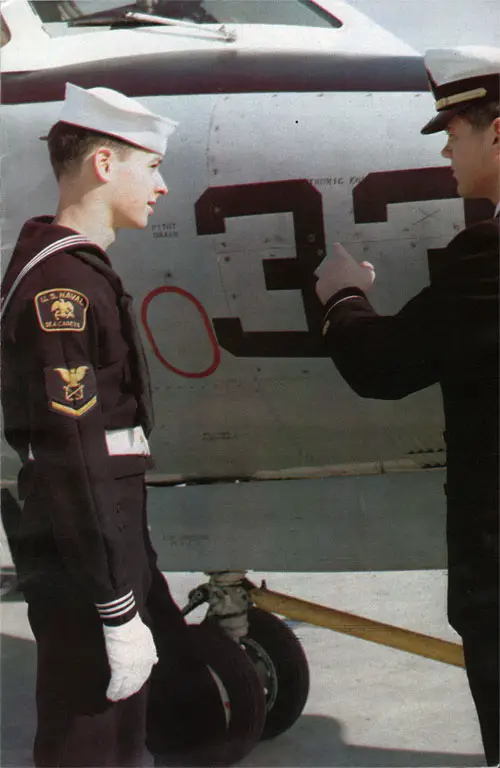
Every Sea Cadet must measure up to rigid physical requirements and pass an examination administered by a Navy physician.
The President of the local Navy League council appoints a NSCC Chairman and committee. Once the President of the local Navy League Council assigns a NSCC Chairman and Committee and allocates operating funds to the committee, it is the responsibility of the committee to implement the NSCC program.
The Chairman and his Committee's responsibilities include obtaining the support of the NSCC unit by the Commanding Officer of a local Navy activity. The Commanding Officer of the Naval activity supports the training and testing of the Cadets; he also assists in recruiting the Sea Cadet Corps officers.
The sponsoring Naval activity provides curriculum, classroom facilities, training aids, textbooks, monitors the training and authenticates the Cadet's advancement in
training progress in his modified Navy enlisted NSCC training jacket. It is the responsibility of the NSCC Chairman, his committee and the NSCC Unit Commanding Officer to maintain the overall administrative supervision of the NSCC unit.
To qualify for membership in the NSCC, the applicant must:
- Be selected without regard to race, religion, or national origin;
- Have the approval of his parents;
- Be a male citizen of the United States;
- Have attained his 14th but not his 17th birthday by 1 September of year entering the Corps;
- Be a full time student and be recommended by his high school principal or counselor; Cadets all over the country train in the most modern Naval Reserve facilities available, using the latest operational equipment.
- Make a qualifying score on the Navy SBTB (Form 2) test;
- Pass a Navy medical examination administered by a Department of Defense medical officer;
- Be motivated for NSCC training.
NSCC training is authorized aboard unclassified Naval shore establishments, ships and planes of the tri-dimensional Navy. Cadets train in accordance with Navy training curricula and in selected educational disciplines approved by the Chief of Naval Personnel. Advancement-inrate training is conducted by qualified civilian NSCC officers and Navy instructors. Prior to advancement-in-rate, cadets must pass the standard Bureau of Naval Personnel's advancement-in-rate examinations administered by Naval personnel.
In addition to the aforementioned classroom and practical factor training, extensive instruction is provided in (1) personal hygiene, (2) moral guidance, (3) social amenities, (4) water safety, (5) military bearing, (6) Navy history, (7) customs and traditions. Cadets are also given presentations explaining civilian and military career opportunities during special scheduled career counseling periods.
In addition to the academic disciplines Sea Cadet recruits (E-1) are authorized to attend two-week training (TWT) at one of the Navy's three recruit training commands (RTC) (San Diego, Great Lakes, Orlando). During the TWT, cadets work hard and enjoy maturing into men. Frequently, the strongly motivated volunteer cadets equal and sometimes outdo regular recruit companies at the recruit training command.
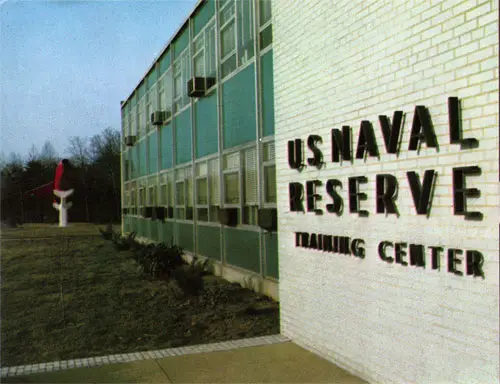
Typical of realistic training aids available at Naval Reserve Training Centers is this full-scale replica of a ship's wheelhouse equipped with signalling and control systems found on functioning ships of the line.
Active duty naval personnel skilled in more than 60 occupational fields are available to instruct Naval Sea Cadets. Sea Cadet Corps officers for the most part are retired military officers and senior petty officers.
Cadets who satisfactorily complete the academic, practical factor requirements, plus the Bureau of Naval Personnel E-2 examination and graduate from RTC are advanced to NSCC Seaman/Fireman, Airman Construction Apprentice (E-2).
Qualified NSCC E-2 cadets enjoy the privilege of completing their practical factor requirements for advancement to NSCC Seaman/Fireman or Constructionman (E-3) aboard fleet ships or naval shore establishments. Special shipboard training periods for cadets are scheduled during school holiday periods and summer months. In order to qualify for this duty, cadets must have successfully completed the prescribed Navy training and examinations and be recommended by the NSCC commanding officer.
Upon satisfactory completion of the advanced TWT practical factor training, NSCC cadets are advanced to NSCC Seaman/Fireman or Constructionman (E-3).
In the case of NSCC Airman Apprentice (E-2), a TWT Naval Air practical factor training is required for promotion to Airman (E-3).
The NSCC has an international exchange training program with the Canadian Navy. Each summer outstanding senior cadets are nominated as "ambassadors" to Canadian training programs.
Two weeks training (TWT), advanced seminars for qualified senior cadets (E-3) or above are conducted in selected Navy schools and in the fields of ocean science and engineering, navigation, submarine, aviation, construction, medical and other specialized fields.
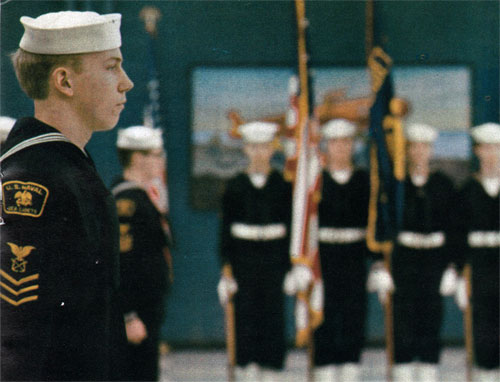
Military drills and bearing play an important part in building character, while practical factor training leads to proficiency and self confidence.
CORRESPONDENCE COURSES:
Another excellent source of training that the Navy affords the Cadets is its Navy Correspondence Course Program. Cadets who desire additional training in petty officer rates or officer orientation programs are authorized to enroll in unclassified correspondence courses.
Cadets who are interested in Naval Officer programs are encouraged to work closely with their high school counselors in developing a college preparatory course of study. Additional briefings for Cadets by Naval Officer Program Officers are designed to assist Cadets to matriculate at the United States Naval Academy or one of the universities sponsoring the NROTC programs.
NSCC OFFICER:
Many NSCC officers are civilians. They are nominated for NSCC officer appointments by the local NSCC chairman. These volunteer civilian officers have no military status and serve without pay. They wear a distinctive NSCC modified Navy uniform with special NSCC identifications approved by the Secretary of the Navy. Any qualified American citizen may be considered for an appointment as an NSCC officer when the following requirements are met:
- Demonstrated an interest and experience in youth training and physical fitness programs;
- Demonstrated strong moral character;
- Be knowledgeable in personnel administration and educational procedures;
- Present exemplary qualities of military bearing;
- Must pass a Navy physical examination.
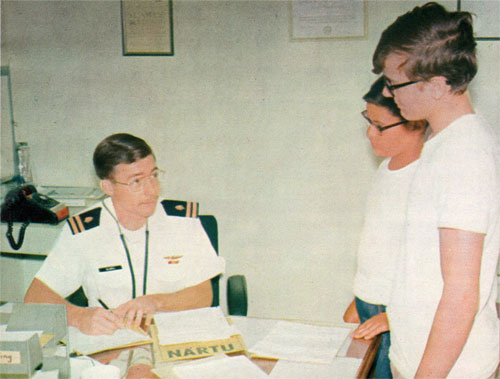
The Chief of Naval Personnel urges active and retired Naval personnel to volunteer their services to assure the highest quality of training and the steady growth of the NSCC program. Officer personnel are encouraged to serve as an NSCC Officer, guest lecturer or instructor while Navy enlisted personnel are encouraged to serve as guest lecturer or instructor.
WHAT ARE THE BENEFITS:
The NSCC training program offers the Cadet the opportunity to train in Naval disciplines. After satisfactory completion of advancementin-rate training and examinations, a qualified cadet may be enlisted in the Navy or Naval Reserve at an advanced E-3 paygrade. Additionally, NSCC Cadet training is beneficial for those Cadets interested and applying for Naval Officer programs.
The objectives of the NSCC program have been recognized as valuable to both the civilian and Navy communities. However, additional Navy League and Navy interest and support will be required if the full potential of this program is to be realized.
Volunteers from the Navy and civilian communities are needed as Instructors or Sea Cadet Officers to strengthen the quality of leadership and training for these young men who have registered a strong interest in our Navy.
The NSCC Navy training program depicts Navy life and shows the volunteer cadet the opportunities afforded in a Naval career. As a result, a qualified Sea Cadet enlists in the Navy because of his interest, motivation and a patriotic desire to serve his country.
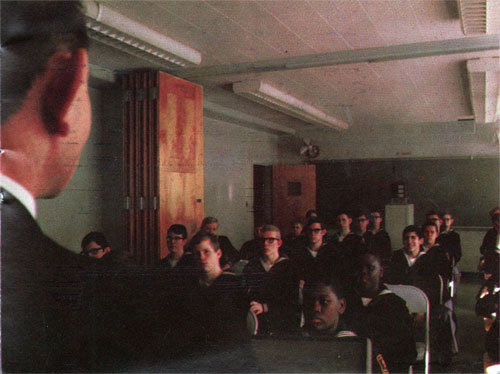
Classroom and on-the-site training share equal importance in the education of Naval Sea Cadet Corps personnel.
Naval Sea Cadets who graduate from the NSCC and choose to continue their affiliation with the Navy as an Officer or enlisted man are excellent sources of Navy manpower. They are also available to augment the membership of the Navy League and the Naval Sea Cadet Corps.
For further information on this outstanding program, please contact the Executive Director, NSCC, 818 Eighteenth Street, N.W.,
Washington, D.C. 20006 or the Department of the Navy, Bureau of Naval Personnel,
NSCC Support Branch, Washington, D.C. 20370.
A limited number of copies of this brochure are available from the NSCC Support Branch (Pers-D22), Bureau of Naval Personnel, Navy Department, Washington, D.C. 20370.
Reviewed and Approved 1 September 1971
CPT D.E OGLEVEE, USNR Director, Advertising Dept. Navy Recruiting Command
